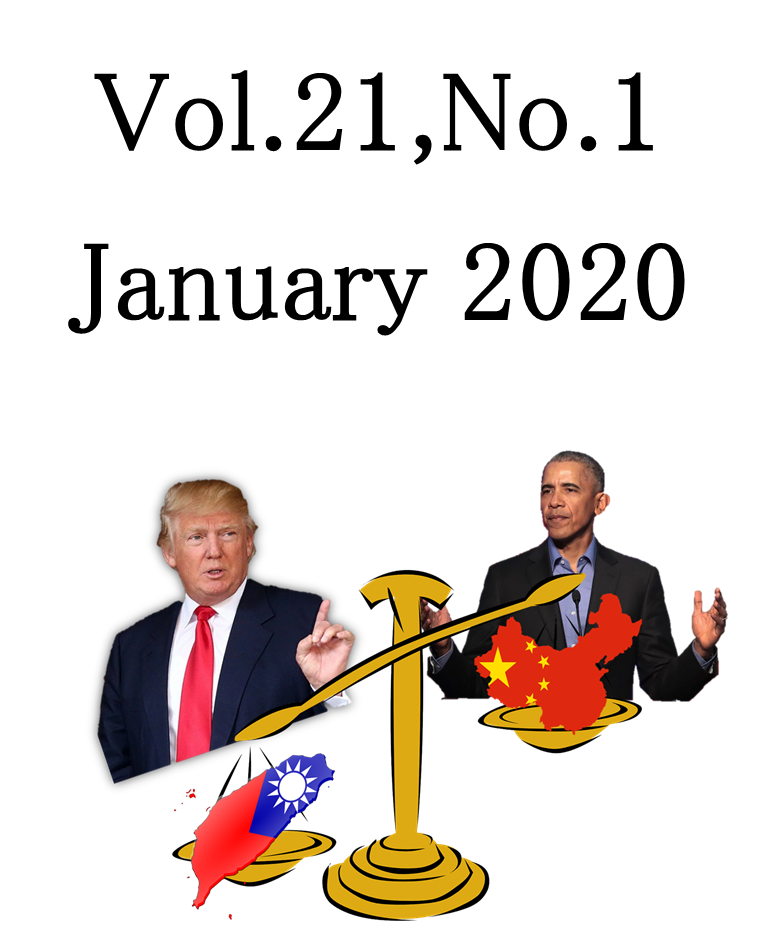The Changing Role of the Balancer in International Politics:Triangular Relations between the U.S., China and Taiwan in the Obama and Trump Administrations
Taiwan Social Sciences Citation Index(TSSCI)
Prospect Quarterly Vol.21 No.1 (January 2020)
The Changing Role of the Balancer in International Politics:Triangular Relations between the U.S., China and Taiwan in the Obama and Trump Administrations
The Changing Role of the Balancer in International Politics:Triangular Relations between the U.S., China and Taiwan in the Obama and Trump Administrations;
Professor,
Political Science Department, National Chung Cheng University
This paper aims to answer three questions. How successfully has the U.S. played the role of a balancer in the triangular relations between the U.S., China and Taiwan? What factors account for the nuances of different outcomes? How do different American presidents adopt various strategic postures to affect the change and continuity of the triangular relations between the U.S., China and Taiwan? This paper argues that when the U.S. opts to fully cooperate the stronger state (China), it can dilute its balancing role and tilt the balance between China and Taiwan. The success or failure of the balance of power is highly contingent on the strategic posture of the balancer over the stronger state or the weaker state. The Trump administration has been more successful than the Obama administration in maintaining a delicate balance between the U.S., China and Taiwan.
Keywords:Balancer, Balance of Power, Strategic Posture, Obama, Trump
Changes in the U.S. Arctic Strategy and Competition and Cooperation with China;
Associate Professor,
Center for General Education, University of Kang Ning
The Arctic reveals some characteristics of classical geopolitics and the overall trend in geopolitics, which emphasizes international cooperation. However, after Donald Trump became the president of the United States, variables emerged in the Arctic, leading the United States toward the direction of classical geopolitics. The Trump administration’s national security strategy has turned to great power competition and emphasized the principle of “America First.” Therefore, the US Arctic strategy has shifted from international cooperation to great power competition. Since the United States regards China as its biggest strategic competitor and security challenger in the future, the two countries may engage in competition and conflict in the Arctic. Yet this does not hinder cooperation between the two countries in the Arctic. In addition to the existing cooperation between the two countries, there is room for cooperation in many fields.
Keywords: The Arctic, Geopolitics, Great Power Competition, One Belt One Road, Near Arctic State
Study on the U.S. National Cyber Strategy in the Trump Era: From the Perspective of the Balance of Threat Theory;
Assistant professor,
& Center for General Education of National Taichung University of Science and Technology
This article reviews the formulation and practice of the Trump administration’s cyber strategy and analyzes it through the Balance of Threat Theory of international relations. The research results show that the current national cyber strategy of the U.S. is aimed to resist security threats. The Trump administration has actively constructed cyber offensive and defensive capabilities internally and developed cross-border cooperation in cybersecurity with friendly countries to balance the challenges from adversaries such as China and Russia. However, the strategy has caused some controversy in the course of its practice because of the obvious unilateral style and could make the future of international cyber politics and the scenario of the Internet more unpredictable.
Keywords:Cybersecurity, The U.S. National Cyber Strategy, The U.S. Foreign Policy, International Cyber Politics, Defending Forward

